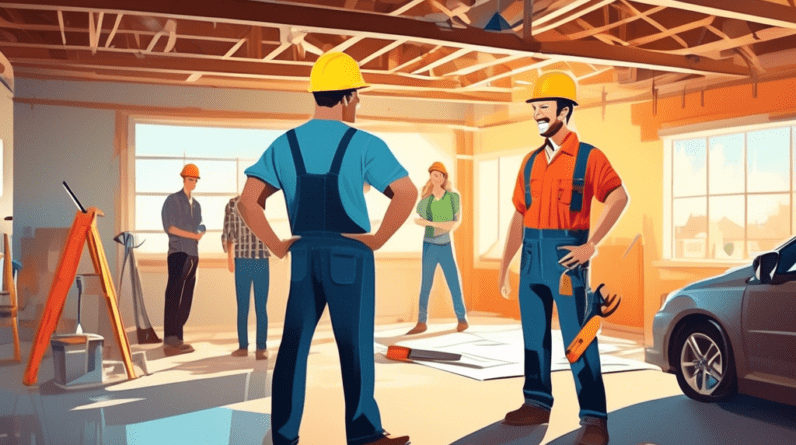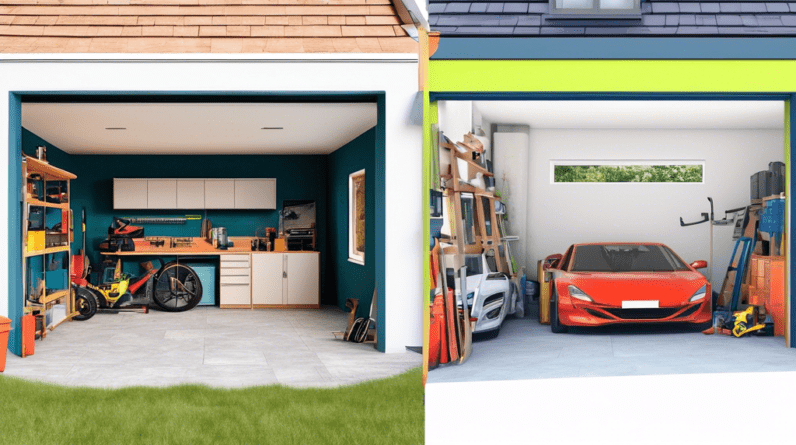
Should You Hire a Professional for Your Garage Conversion?
Embarking on a garage conversion is an exciting way to add valuable living space to your home without the upheaval of a traditional extension. However, it’s a project with hidden complexities, and deciding whether to DIY or bring in the professionals is a crucial first step. This article delves into the costs associated with hiring professionals for your garage conversion, empowering you to make informed decisions.
Assessing Your Needs and Budget
Before diving into the costs, take time to define your vision. Are you dreaming of a luxurious guest suite, a state-of-the-art home office, or a fun-filled playroom for the kids? Clarity on your desired outcome will guide your choices and help you communicate effectively with potential contractors.
Once you have a vision, establish a realistic budget. Include a contingency fund for unexpected expenses, typically around 10-20% of the total project cost. This financial cushion provides peace of mind and helps you navigate unforeseen challenges.
Breaking Down the Costs of Hiring Professionals
Hiring professionals ensures your garage conversion is in expert hands, adhering to building codes and safety standards. Here’s a breakdown of the typical costs associated with each professional you might need:
Architect/Designer (5-15% of Total Project Cost)
- For complex projects involving structural changes or unique design elements, an architect or designer is essential. They will:
- Create detailed plans and blueprints
- Ensure the design meets building regulations and structural requirements
- Assist with obtaining necessary permits
Structural Engineer (2-5% of Total Project Cost)
- If your conversion involves removing walls, adding windows, or altering the roofline, a structural engineer will:
- Assess the structural integrity of your garage
- Design solutions for supporting the existing structure
- Prepare detailed engineering drawings
General Contractor (10-20% of Total Project Cost)
- The general contractor is your project manager, overseeing all aspects of the conversion, including:
- Hiring and coordinating subcontractors
- Managing timelines and ensuring work progresses smoothly
- Ordering materials and handling deliveries
Subcontractors (40-60% of Total Project Cost)
Depending on the scope of your project, you’ll need a team of skilled subcontractors, including:
- Electricians: Installing wiring, outlets, switches, and lighting fixtures
- Plumbers: Adding plumbing for bathrooms, kitchenettes, or laundry areas
- HVAC Technicians: Extending or modifying your heating, ventilation, and air conditioning system
- Drywall Installers: Hanging, finishing, and painting drywall
- Insulation Installers: Ensuring proper insulation for energy efficiency and comfort
- Flooring Installers: Installing your chosen flooring material
Material Costs (20-30% of Total Project Cost)
Material costs can vary significantly depending on the quality and type of materials you choose. Key materials include:
- Lumber and framing materials
- Insulation
- Drywall
- Windows and doors
- Electrical wiring, outlets, and fixtures
- Plumbing fixtures and pipes
- Flooring
- Paint
Factors Influencing Garage Conversion Costs
Understanding the variables that can impact your garage conversion budget empowers you to make informed decisions. Key factors to consider include:
Location
Labor costs can fluctuate depending on your geographical location. Urban areas and regions with a high cost of living often have higher labor rates.
Size of Garage
Larger garages require more materials and labor, resulting in higher overall costs. Consider whether you need to convert the entire space or if a partial conversion would suffice.
Complexity of Design
Intricate designs involving structural changes, vaulted ceilings, or high-end finishes will significantly increase costs compared to a simple conversion.
Existing Conditions
The condition of your existing garage, including the foundation, walls, roof, and electrical system, will impact the scope and cost of the project.
Material Choices
Opting for premium materials like hardwood flooring, custom cabinetry, and designer lighting fixtures will naturally increase your budget compared to standard options.
Permitting Fees
Most garage conversions require building permits, the costs of which vary depending on your location and the scope of the project.
The Value of Hiring Professionals
While hiring professionals for your garage conversion comes at a cost, it offers numerous benefits that often outweigh the initial investment:
Expertise and Quality Craftsmanship
Professionals bring a wealth of experience, ensuring your conversion is completed to the highest standards, adhering to building codes, and meeting safety regulations. This expertise minimizes the risk of costly mistakes or future problems.
Time Savings
Professionals work efficiently, completing the project within a reasonable timeframe. Their experience and established processes prevent costly delays and allow you to enjoy your new living space sooner.
Stress Reduction
Converting a garage is a complex undertaking. Hiring professionals relieves the stress of managing multiple contractors, sourcing materials, and ensuring the project stays on track.
Increased Home Value
A well-executed garage conversion by licensed professionals significantly enhances your home’s market value, potentially providing a substantial return on investment.
Conclusion
Hiring professionals for your garage conversion is an investment that pays dividends in terms of quality, efficiency, and peace of mind. By carefully planning your budget, understanding the factors influencing costs, and choosing experienced professionals, you can create a stunning new living space that enhances your home and lifestyle.






